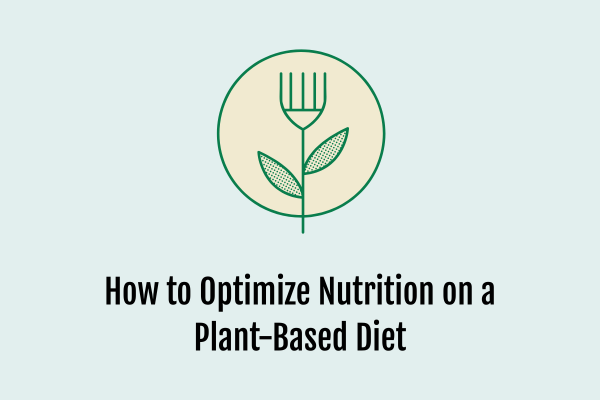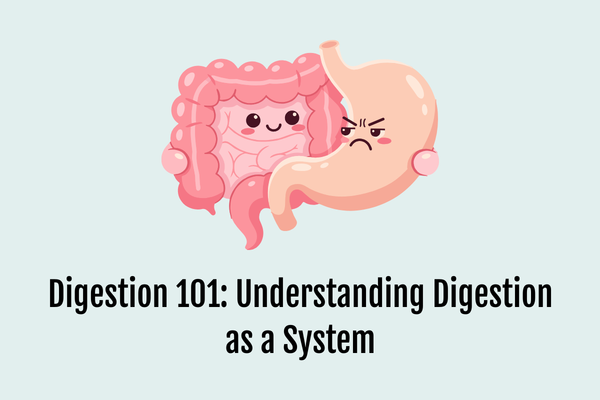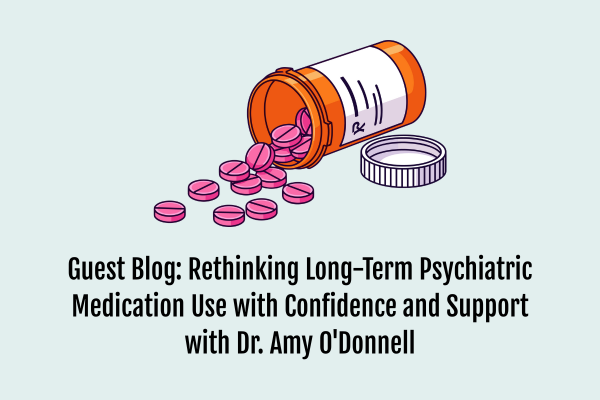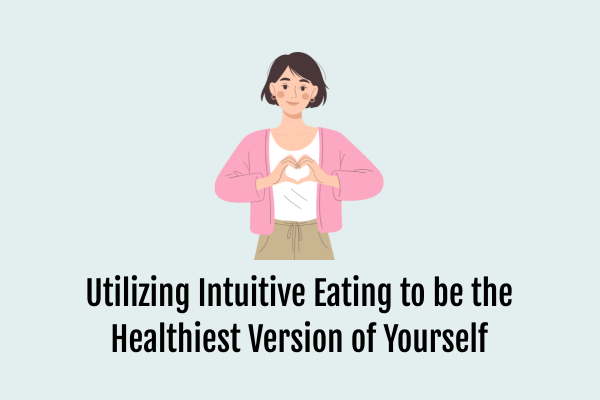How to Optimize Nutrition on a Plant-Based Diet
Written by: Sophia Schweiger
Reviewed by: Devon Epitropoulos (Kroesche), MS, RDN, LDN
The popularity of plant-based eating has skyrocketed—and for good reason. Whether you're vegan, vegetarian, or simply plant-forward, shifting to a diet centered around plants can support healthy eating, improve longevity, and reduce your environmental footprint.
On the flip side, improperly balanced plant-based diets can result in nutrient gaps, low energy, and digestive issues. Optimized nutrition on a plant-based diet requires more than just cutting out or limiting meat—it involves strategic meal planning, smart meal prep, and a focus on personalized nutrition that supports your lifestyle and health goals.
In this post, we’ll cover everything you need to know to thrive on a plant-based diet—from key nutrients to food swaps, label reading, and meal ideas.
What Does “Plant-Based” Really Mean?
Before we dive into the details, let’s clarify what “plant-based” can include.
● Vegan: Excludes all animal products (meat, dairy, eggs, honey)
● Vegetarian: May include eggs and dairy but excludes meat and fish
● Flexitarian: Primarily plants, but allows occasional animal products
● Whole-food plant-based: Focuses on unprocessed, whole plant foods without added sugars, oils, or refined grains
If you're interested in following a plant-based diet, a registered dietitian can help tailor the approach to your goals—whether you're aiming for more energy, better digestion, improved heart health, or a smaller environmental footprint.
The Benefits of a Plant-Based Diet (When Done Right)
Plant-based diets are associated with:
● Lower risk of heart disease, type 2 diabetes, and certain cancers
● Reduced inflammation and improved gut health
● Lower body weight and cholesterol levels
● Enhanced longevity and healthy aging
But not all plant-based diets are created equal. Oreos, French fries, and soda are technically vegan. While everything is great in moderation, these foods won't do much for your overall nutrition or long-term wellness if eaten in excess.
To truly reap the benefits, it's essential to focus on nutrient-dense whole foods and strategic meal planning.
Key Nutrients to Prioritize on a Plant-Based Diet
Plant-based diets can be rich in fiber, antioxidants, and healthy fats, but some nutrients require extra attention. Here’s where a dietitian can guide you in optimizing your intake:
1. Protein
Why it matters: Supports muscle mass, immune function, and satiety
Plant-based sources:
● Lentils, chickpeas, black beans
● Tofu, tempeh, edamame
● Quinoa, buckwheat, amaranth
● Nuts, seeds, and nut butters
● Plant-based protein powders (pea, hemp, soy)
The RDA for protein for adults is 0.8g/kg each day. However, plant proteins are considered “incomplete proteins”, making them less bioavailable than animal sources of protein. Therefore, it is essential to aim for the protein RDA each day to prevent a deficiency. You can achieve this goal by aiming for a protein source at every meal and snack, as well as making meal prep protein staples ahead of time for easy access to high-protein foods.
2. Vitamin B12
Why it matters: Essential for energy production and nervous system function
Plant-based tip: Vitamin B12 is not naturally found in plant foods. Supplementation is recommended, especially for vegans.
Sources:
● Fortified nutritional yeast
● Fortified plant milks and cereals
● B12 supplements (cyanocobalamin or methylcobalamin)
The RDA for vitamin B12 in adults is 2.4 mcg per day; however, this amount may be increased due to factors such as pregnancy/lactation, older age, and diet (specifically vegetarians and vegans). Consulting with a dietitian can help determine a deficiency and how to obtain adequate vitamin B12 within your diet.
3. Iron
Why it matters: Supports oxygen transport and energy levels
Plant-based sources:
● Lentils, tofu, tempeh
● Pumpkin seeds, blackstrap molasses
● Dark leafy greens (spinach, kale)
● Iron-fortified cereals
The RDA for iron ranges from 8-27 mg each day, depending on assigned sex at birth, whether a woman is pre- or post-menopausal, as well as if a woman is pregnant and/or lactating. It is also important to note that iron from plant sources is considered a “non-heme” iron source. Non-heme iron sources are absorbed less efficiently than heme iron sources found in animal products. Therefore, if you are following a plant-based diet, it is important to consult a dietitian to make sure you are not iron-deficient. A dietitian can work with you to create a personalized meal plan to ensure that you are meeting the RDA for iron.
Dietitian tip: Pair iron-rich foods with vitamin C (like citrus or bell peppers) to enhance absorption.
4. Omega-3 Fatty Acids (ALA, EPA, DHA)
Why it matters: Critical for brain health and reducing inflammation
Sources:
● Flaxseeds, chia seeds, walnuts
● Hemp seeds
● Algae-based DHA/EPA supplements
The adequate intake for ALA (source of omega-3s found in plant-based sources) ranges from 1.1 g/day for females and 1.6 g/day for males. Plant-based omega-3s are primarily ALA, which your body converts (inefficiently) to DHA and EPA—these sources of omega-3s are found in animal products such as seafood. Therefore, it is important to consult with a registered dietitian to determine your nutrient status, as well as whether supplementation may be necessary.
5. Calcium
Why it matters: Supports bone health and muscle function
Plant-based sources:
● Fortified plant milks (soy, almond, oat)
● Calcium-set tofu
● Chia seeds, tahini
● Broccoli, bok choy, kale
● Fortified orange juice
The RDA for calcium for adults ranges from 1,000-1,200 mg/day based on sex assigned at birth, as well as pregnancy, lactation, and menopause.
6. Zinc
Why it matters: Supports immune health and wound healing
Sources:
● Pumpkin seeds, cashews, chickpeas
● Whole grains
● Tofu, tempeh
● Fortified cereals
The RDA for zinc for adults ranges from 8-12 mg/day, depending on sex assigned at birth, as well as pregnancy and lactation. Zinc from plant foods is less bioavailable, so include it regularly within your diet to ensure sufficient levels.
7. Iodine
Why it matters: Essential for thyroid health
Plant-based sources:
● Seaweed (nori, dulse, kelp)
● Iodized salt
● Iodine-containing multivitamins
The RDA for iodine in adults is 150 µg/day, but this amount is increased during pregnancy and lactation. If you avoid dairy and seafood, it’s important to consult a registered dietitian in order to ensure adequate intake of iodine within your diet.
Balanced Meal Planning on a Plant-Based Diet
When transitioning to plant-based eating—or fine-tuning your approach—the foundation of meal planning is variety, color, and consistency.
The Plant-Based Plate Method
A simple visual tool that mirrors dietitian guidance:
● ½ Plate: Non-starchy vegetables (spinach, peppers, mushrooms, broccoli)
● ¼ Plate: Whole grains or starchy vegetables (brown rice, sweet potatoes, corn, quinoa)
● ¼ Plate: Plant-based protein (tofu, beans, tempeh, lentils)
● + Healthy fats: Avocado, nuts, olive oil, tahini
● + Flavor: Herbs, spices, nutritional yeast, lemon juice, sauces
Meal prep can also greatly impact consistent healthy eating, especially when you're plant-based and need a variety of whole foods ready to go. Having batch-cooked grains on hand, pre-marinating plant-protein sources, as well as meal prepping nutrient-dense snacks, can help immensely when it comes to achieving adequate intake of nutrients.
The Role of Personalized Nutrition in Plant-Based Eating
What works for one plant-based eater may not work for another. That’s where personalized nutrition comes in.
A registered dietitian nutritionist can tailor your plant-based plan based on:
● Nutrient needs (e.g., iron or calcium levels)
● Digestive concerns (e.g., IBS, bloating, or sensitivities)
● Fitness goals (muscle gain, fat loss, endurance training)
● Hormonal health (PCOS, thyroid, fertility)
● Lifestyle preferences and cultural traditions
Whether you're a long-time vegan or just cutting back on meat, personalized nutrition helps you fine-tune your meals and supplements for optimal results.
Watch Out for Common Plant-Based Pitfalls
Even with the best intentions, plant-based diets can sometimes miss the mark. Here are common issues to avoid:
1. Over-Reliance on Packaged Vegan Foods
Many meat alternatives and vegan snacks are ultra-processed, high in sodium, and lacking in nutrients.
Tip: Choose whole food versions when possible—lentils over highly processed vegan sausage, or homemade bean burgers over frozen patties.
2. Skipping Protein
Without meal planning, it’s easy to fall short on protein when following a plant-based diet.
Tip: Have various options of plant-based protein sources on hand—beans/bean dips, lentils, tofu, nuts/seeds, etc.—and base meals and snacks around these sources.
3. Missing Critical Micronutrients
Vegan and vegetarian diets can lack vitamin B12, vitamin D, iron, and omega-3 fatty acids.
Tip: Work with a dietitian nutritionist to assess your nutrient status, as well as supplementation if necessary.
4. Digestive Upset from Too Much Fiber Too Fast
Increasing fiber is great, but do it gradually and make sure to drink plenty of water.
Ready to Thrive on a Plant-Based Diet?
Whether you’re just starting out or looking to optimize your plant-based approach, the right support makes all the difference.
Reach out to scheduling@casespecificnutrition.com to connect with a Case Specific Dietitian who can create a customized, nutrient-dense plan tailored to your goals, lifestyle, and values. Our team provides individualized nutrition care across the Greater Pittsburgh area, as well as in Erie, Raleigh, and Tampa.
Disclaimer: The information provided in this blog is for educational purposes only and is not intended to diagnose, treat, cure, or prevent any medical condition. This content is not medical advice and should not be used as a substitute for professional medical care. If you have any health concerns or medical conditions, please consult with a qualified healthcare provider before making any changes to your diet or lifestyle.





.webp)

